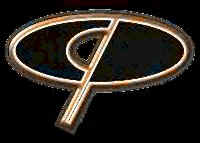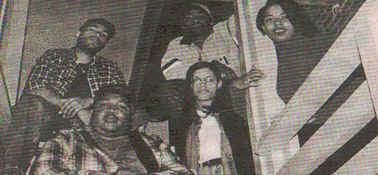Forget the whole East Coast/West Coast thang... this group of
rappers are determined to place Omaha directly in the center of the Hip-Hop World.
|
 |
|
It's a Crossphade Family Affair
By Tim McMahan
|
Find out more about the Crossphade Family project at their
website. |
While
the rest of the country has embraced urban music, the scene seems almost nonexistent in
Omaha. Unless you look for it. You sure as hell ain't gonna find it in the heart of the
Old Market. Meanwhile, in the heart of north Omaha, there's a crew -- a family --
that's recording hip-hop as good as anything you'll hear on MTV or BET (as of this
writing, Omaha no longer has an urban radio station). They're the Crossphade Family - DJ
Suicide, Blak Steel, Jay Money, Breathless, Supreme, Hurricane, the Y.T.D. and Ben Kpone.
And in the style of Puff Daddy's family, the crew features a posse of rappers each with a
unique style and flow that could fit in on the East Coast, West Coast, or right in the
center of the map.
Todd Martin, a.k.a. Sinsta Kane, a.k.a. the Lyrical Assassin, the guy behind Blak
Steel, is half of the duo that put the project together with the engineer supreme, Todd
Reese, a.k.a. DJ Suicide, CEO of the Crossphade Family.
Martin looked anything but the stereotype of a young MTV rapper - no crazy oversized
clothes, no sunglasses, no glam, just casual a Midwest look, in a plaid shirt, and
overalls; smooth with a light mustache and small gold hoop earring in each ear. Speaking
intensely about the project from across a booth at Dundee's Goldberg's, Martin tried to
explain why hip-hop isn't lost in Omaha, why Crossphade Family is so intent on making the
"heartland" a hip-hop hot spot, and how a sound as unique and funky as theirs
could come from a farm town hundreds of miles from anything resembling a skyscraper.
"We strive for originality and distinction -- something abstract and original as
possible," Martin said. "We have our own sound. The key pieces to our hip-hop:
our beat and music; our flow, and the lyrics."
Their new CD is called "681," as in the first three numbers in the zip codes
in this area. Not all the songs are about Omaha, but all have been influenced by the
artists growing up and living here. |

"We want to be considered in the Midwest
what Deathrow was to the West Coast." |
|
I'm no expert on rap or hip-hop, but I know what I like and don't like. What I
don't like is rap that's overly dependent on samples - instrumental tracks minus vocals
lifted from popular songs of the past (see Puff Daddy and his almost obscene lifting of
Led Zeppelin and Police tracks in last year's mega-hits that bordered more on theft of
ideas than tribute). I also don't like unrhythmic, sloppy, hurried rapping, where the MC
is desperately trying to cram as many words as possible into a phase, destroying the beat
(see Wu Tang Clan, wherein most lyrics are an undecipherable mess).
Crossphade is more of a tuned up, high-tech version of the old school hip-hop that the
artists grew up on, like Rakim, KRS-1, Grandmaster Flash, Curtis Blow or Run DMC. They
don't use samples, except for a couple guitar lines lifted by permission from local
R&B act, Beebe, who Suicide has produced. Instead, the sounds heard on 681 are all
Suicide's creations. In addition to his outrageous, thick-ass beats, Crossphade's other
distinction is quality rhyming, dropped straight on the beat where it belongs. Breathless'
tracks, among the best of the bunch, are four minutes of unbridled sass, clever and funky
enough to make Missy Elliot blush in comparison. Martin as Kane is a confident black voice
(see KRS-1), Supreme and Jay Money are the troublemakers, while Suicide is a voice of
urban wisdom. Taken together on one disc, 681 holds tight like the product of a hip-hop
family, each sibling with a unique voice, held together under an unstoppable groove.
Martin said the family formed around DJ Suicide. He was and is a household name in his
neighborhood, having been a DJ since sixth grade. "He had the hip hop lyrics, beats
and skills. We were all basically solo artists who came to Suicide to work on our
projects. He figured we'd have greater strengths in numbers. He started with 30 artists
four years ago, shook the sheets and ended up with me and the other six who formed
Crossphade."
The CD's tracks all were born in "the Bat Cave," a 2-bedroom apartment
converted into a demo studio situated "right in the middle of the hood," Martin
said. "We put all the music together there. We have a keyboard, drum machine, DAT and
4-track recorder. The mic is in a padded closet; we want the cleanest sound
possible."
The artists can come to the Bat Cave just about anytime and lay down a rhyme. Within a
few hours, Suicide can take the vocal, lay down his back tracks and beats, and turn it
into a finished demo. When it's time to go into Rainbow Studios to remix, Martin and Reese
have a 2-man listening party and sort through the dozens of tracks, picking two from each
artist. 681 was released Dec. 5, and Martin says he and Reese already are starting on the
next Rainbow sessions in January. "We've probably got over 500 tracks already. We've
created a formula for making CDs," Martin said.
The sound quality of 681 is pristine, some of the best recording done in Omaha. The
CD's funked up hip-hop would sound good over anyone's car stereo. But what difference does
it make how good the CD is if no one hears it? Martin said Crossphade had a taste of
success with their first project, "Behind Enemy Lines," released last year. That
CD received some limited airplay in markets such as Florida and Washington D.C., and as
far away as Belgium and Norway.
"We're working on a getting a buzz started," Martin said. "We want to be
considered in the Midwest what Deathrow was to the West Coast. It's as simple as making a
phone call. We hit the college and public radio stations and tell them we have material
that would fit nicely in their format. We approach it like a pebble dropping in a pond,
slowly making bigger and bigger ripples. We're already sitting on more than 60 stations
requesting material."
He and Reese have been approached by record labels, but are more interested in netting
a good distribution deal. They finance the recording and production themselves. "We
want to make 90 cents off a dollar, and we won't get that unless we're careful who we deal
with," Martin said. "You have to know what you're doing when you step into this
industry. If you rush it, nine times out of 10 you'll regret it. Those people are here to
make money and finagle you out of your copyrights and publishing rights. " |
The CD's tracks all were born in "the Bat
Cave," a 2-bedroom apartment converted into a demo studio situated "right in the
middle of the hood."
|
"Drugs, gangs, violence, I don't want to
build a castle of sand so that I can watch it wash away when the tide comes in."
|
Martin said no one in the Crossphade Family is in a hurry. He works as an
auditor at First Data, Brigette Archer, a.k.a. Breathless, works at Woodman of the World;
two other members go to college. "One of the stipulations for being in the family is
that if you got any junk tied to you that's going to cause us any problems, you have to
leave," Martin said. "Drugs, gangs, violence, I don't want to build a castle of
sand so that I can watch it wash away when the tide comes in."
In addition to radio, Crossphade wants to tour. Martin said he wants to continue
polishing the family's stage presence, but Omaha doesn't have many showcases for hip-hop
acts and there's fear by venue owners that a rap performance could spawn violence.
"It's ironic. Hip-hop was constructed in New York to stop gang violence. We battle
lyrically. It goes back to the days of break dancing and turntables. I say a rhyme that's
supposed to break your shield and you counter with your own. If I lose, it won't come to
fisticuffs."
But that all changed with the rise of gangsta rap, Martin said, especially outfits like
NWA. "What they did was unleash their nightmares on society. Now we have gangbanging
on the streets of Omaha and North Little Rock. I grew up listening to it and it almost
hypnotizes you. You had a lot of kids that listened to it; you had a lot of kids that went
to jail. It may have been a direct result of it. I think it's been extremely
destructive."
He says Crossphade's lyrics were born on the streets of North Omaha. Martin lived on
North 60th and before that, on Lafayette. He never knew gang-banging. "I'm almost 30,
and the atmosphere in the ghetto was a lot different 20 years ago," Martin says.
"The ghetto wasn't violent as it is now. I thought it was damn fun. It was almost
like a family network. It wasn't something you'd cringe at. You had block parties and
swimming pools. Before Nintendo, we'd play kickball and football and stay out until the
lights came on."
Kids today, Martin said, are more angry and violent. "I don't think the next
generation is gone, but it starts with the kids, everyone is too afraid to say things to
them."
The key to change in the inner city is education, he said. "The hell with gym
classes. We need to teach economics and homemaking. Some of the young kids don't know how
to keep a house up. Some of these classes are for the birds. As far as black people, we
need lessons on economics."
(return
to the profiles home)
Originally printed in The Reader December 17, 1998.
Copyright © 1998 Tim McMahan. All rights reserved.
|
|
|

![]() webboard
interviews
webboard
interviews